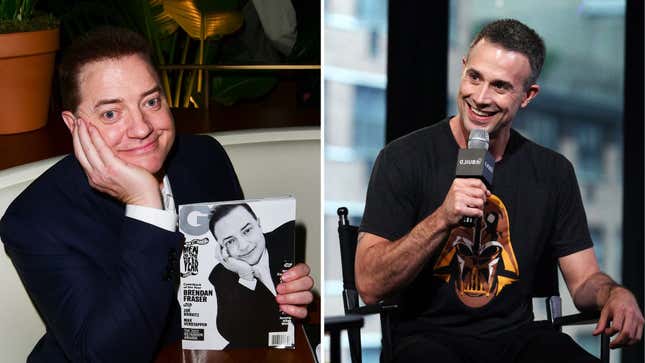These Beloved Himbos May Restore My Faith in Men
Thanks to a new interview, I've learned nineties heartthrobs Freddie Prinze Jr. and Brendan Fraser are not only friends but..pretty emotionally intelligent?
Celebrities

Lately, I’ve been thinking a lot about male bull elephants or, more specifically, Megan Fahy’s soliloquy about them in episode 3 of this season’s The White Lotus, and what happens once they come of age: “…and then the bull elephant has to, like, wander through the jungle by himself for the rest of his life. I feel sorry for men, y’know? It’s like they think they’re out here doing something really important but really they’re just wandering alone.” Most days, I tend to agree, until that is, I encounter evidence to the contrary, like this delightfully tender interview featuring Freddie Prinze Jr. and Brendan Fraser—marked by special appearances from both of their tear ducts (mine, too).
On Tuesday, Interview magazine published a surprisingly candid conversation between the two nineties-era heartthrobs (and longtime friends!) that had the pair discussing everything from Fraser’s harrowing turn as Charlie in The Whale: “I gave everything that I thought I knew how to do.” to Prinze Jr’s complex relationship with his own father, the late Freddie Prinze: “I don’t know how to say this the way I want to without breaking down completely, but I don’t hate him anymore.” And, like any true thespian, they got emotional about a mutual desire to disappear completely into a character: “It’s not really me. It’s the mask.” At more than one point, Prinze Jr. and Fraser are so moved by their own conversation that they both admit they’re either on the verge of breaking down or already weeping.
-

-

-

-

-

-

-

-

-

-

-

-

-

-

-

-

-

-

-

-

-

-

-

-

-

-

-

-

-

-

-

-

-

-

-

-

-

-

-

-








































